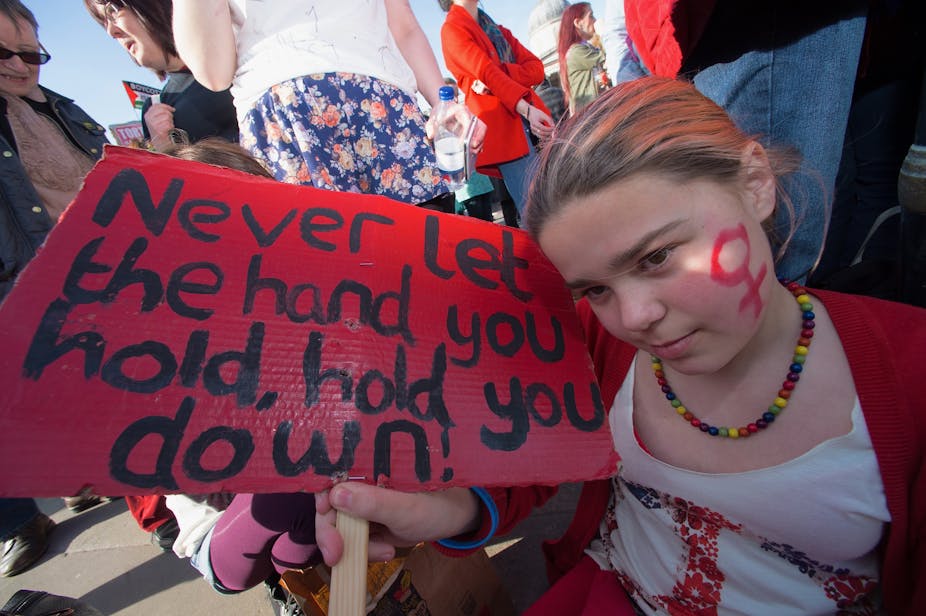Results from the National Community Attitudes Towards Violence Against Women (NCAS) 2013 Survey have been released today by VicHealth, and there is reason to be concerned about Australians’ attitudes to rape and violence. A surprising proportion of Australians endorse attitudes that minimise and trivialise rape. Many apportion blame to the victim while excusing the actions of perpetrators.
The findings reflect heightened concerns globally over the extent of rape culture - widely held societal norms and attitudes that condone, normalise or minimise sexual violence against women in our communities. Such attitudes play a key role in shaping the way that individuals, organisations and communities respond to sexual violence. The NCAS results show that Australia, like many other countries, has a real problem.
Key survey findings
While overall the NCAS findings showed stability in many areas, some key attitudes regarding sexual violence had worsened since the survey was last run in 2009.
Fewer Australians agreed that women are more likely to be raped by someone they know than a stranger in 2013 (64%) than in 2009 (70%) and 1995 (76%). More of us agreed that rape results from men being unable to control their need for sex in 2013 (43%) than in 2009 (35%). Together these findings show a decline in community understandings of the nature and causes of sexual violence.
One in six in our community agreed with the deplorable notion that women say “no” when they mean “yes”. One in ten endorsed the view that if a woman doesn’t physically resist, even if protesting verbally, then it isn’t really rape. Slightly more (12%) agreed that if a woman goes to a room alone with a man at a party, it is her fault if she is raped.
Perhaps most concerning is that more than one in three (38%) Australians holds the attitude that a lot of times women who say they were raped had led the man on and later had regrets.
These results reveal a very poor understanding of sexual consent among a sizeable minority of the Australian community.
Younger people aged 16 to 25 generally had poorer attitudes about sexual assault. This is particularly alarming since this age group is also over-represented among both victims and perpetrators. With as many as one in five women experiencing sexual violence since the age of 15, there can be no doubt that Australia has a long way to go to overcome this problem.
Why culture matters
Too often when people talk about culture and sexual violence, they think of problems “out there” in the world. It is comforting, perhaps, to criticise other nations for their attitudes towards women and to tell ourselves that in Australia women are treated equally and with respect.
But rape culture and its impacts are a global problem and the NCAS survey results show that Australia is not immune.
In a culture that minimises, trivialises or excuses sexual violence - and shifts responsibility away from perpetrators and onto victims - individuals, organisations and communities are less likely to respond. When attitudes condoning sexual violence are common, some men are more likely to feel it is okay to behave disrespectfully or even violently. We as a community are less likely to take action to intervene, or to support a victim.
In a culture that fails to take rape seriously, victims feel afraid to seek help. They are unsure of what kind of response they are going to receive from friends, family and institutions like police and courts.
Yet sexual violence and the attitudes that condone it are not character faults in individuals; they are learned. If we want to change attitudes we need to change our culture and the influences that shape it. This involves the way we raise boys and girls, the way men’s and women’s relationships are shown in media and popular culture, and the position our leaders take on this issue.
Much important work remains to be done to tackle, and ultimately prevent, sexual violence in Australia. We have to challenge rape culture at its source. This means addressing gender inequality as well as the attitudes and behaviours that minimise, trivialise or excuse sexual violence.
We can start with early education with young people, delivering programs that teach respectful relationships and sexual ethics as the basis for consent. Individuals can take a stand against gender inequality and its everyday occurrences - whether it’s sexism, harassment or violence against women. Organisations and workplaces have an important role in acting on sexual harassment and discrimination.
State and territory governments and law enforcement must improve justice options for victim-survivors of sexual violence. National leadership and political commitment, through the National Plan To Reduce Violence against Women and Their Children and independent bodies such as Our Watch, are vital to ensure consistent action.
To prevent sexual violence we must work together to reject inequality and build an Australian culture of respect.
Editor’s note: Anastasia will be on hand for an Author Q&A session between 9:30 and 10:30am tomorrow (September 18). Post any questions about rape culture and sexual violence in the comments below.

